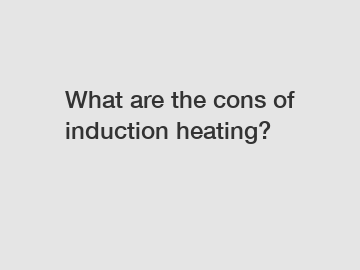What are the cons of induction heating?
What are the cons of induction heating?
Induction heating, like any other technology, has its share of disadvantages. While it offers several advantages over traditional heating methods, it also comes with its drawbacks. Understanding these cons is crucial for businesses and individuals considering the adoption of induction heating systems.
One of the primary cons of induction heating is the high initial cost of equipment. Compared to conventional heating methods, induction heating systems are often more expensive to purchase and install. This cost can be a significant barrier, especially for small businesses or individuals with limited budgets. Additionally, the specialized nature of induction heating equipment may require additional training for operators, further increasing the overall cost.

Another drawback of induction heating is the limitation in the type and size of materials that can be heated effectively. Induction heating relies on the principle of electromagnetic induction, which generates heat in conductive materials. While this works well for materials like metals and their alloys, it is not as effective for non-conductive materials such as plastics or glass. Furthermore, the size of the material also affects the efficiency of induction heating. Large and bulky materials may not heat uniformly or may require longer heating times.
The efficiency of induction heating can also be affected by the presence of magnetic materials in the vicinity. Magnetic materials can disrupt the electromagnetic fields generated during induction heating, leading to uneven heating or reduced efficiency. This limitation may require additional precautions or adjustments in the heating process to ensure consistent results.
Despite these cons, induction heating offers significant advantages that make it a preferred choice in many applications. The precise and controllable heating process allows for targeted heating, minimizing heat loss and reducing energy consumption. Additionally, induction heating offers rapid heating rates, leading to shorter process times and increased productivity. The ability to heat only the desired area of a material can also result in improved product quality by reducing distortion, warping, and oxidation.
In conclusion, while there are cons associated with induction heating, its advantages often outweigh the disadvantages. The initial cost and limitations in material compatibility and magnetism sensitivity should be carefully considered. However, the efficiency, precision, and productivity benefits make induction heating a valuable technology in various industries. Understanding the pros and cons of this heating method allows businesses and individuals to make informed decisions regarding its implementation, ultimately leading to improved heating processes and overall efficiency.
If you want to learn more, please visit our website induction brazing machine induction brazing equipment, induction heater for industrial use, heat treatment and induction tempering.
402
0
0


Comments
All Comments (0)